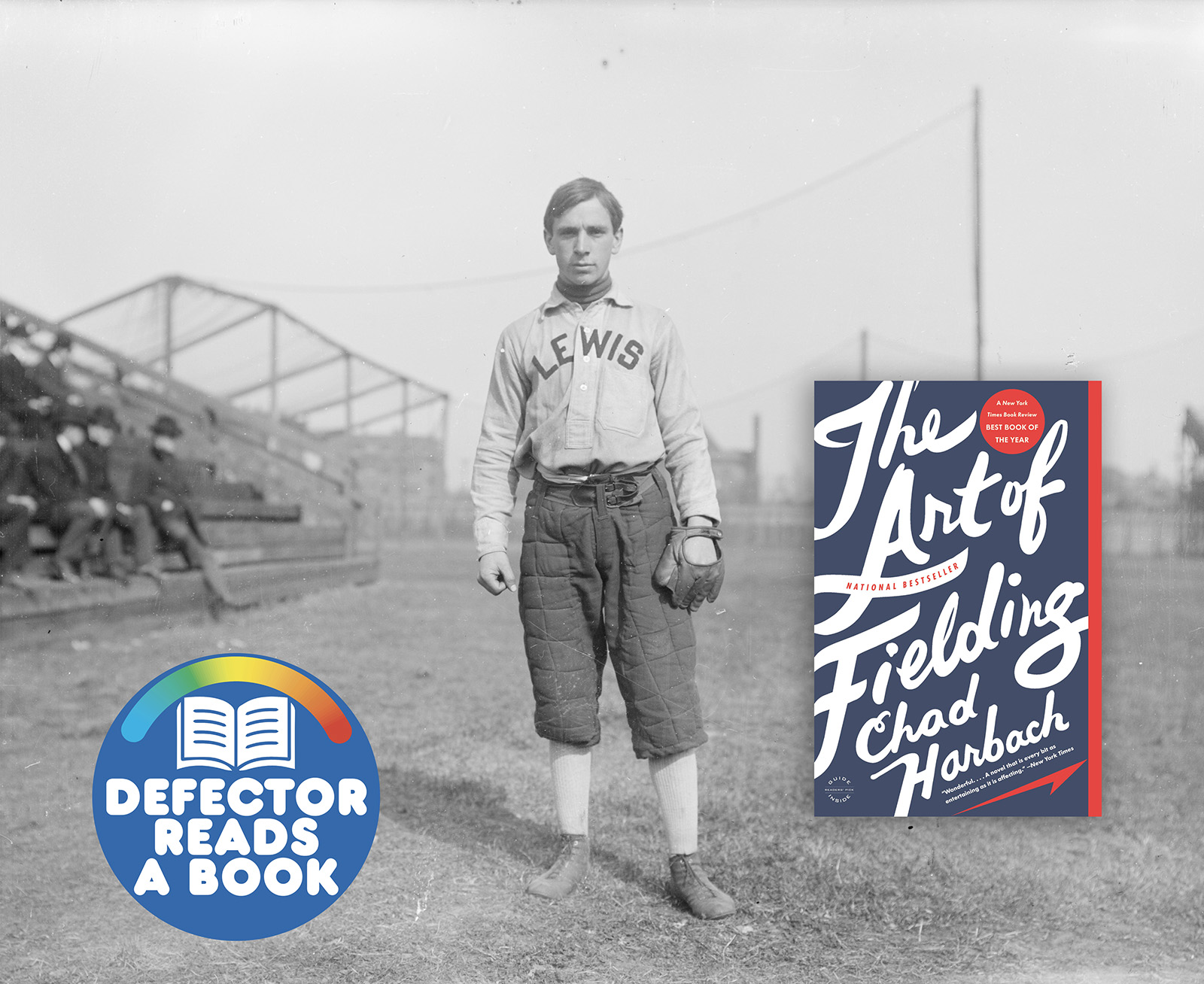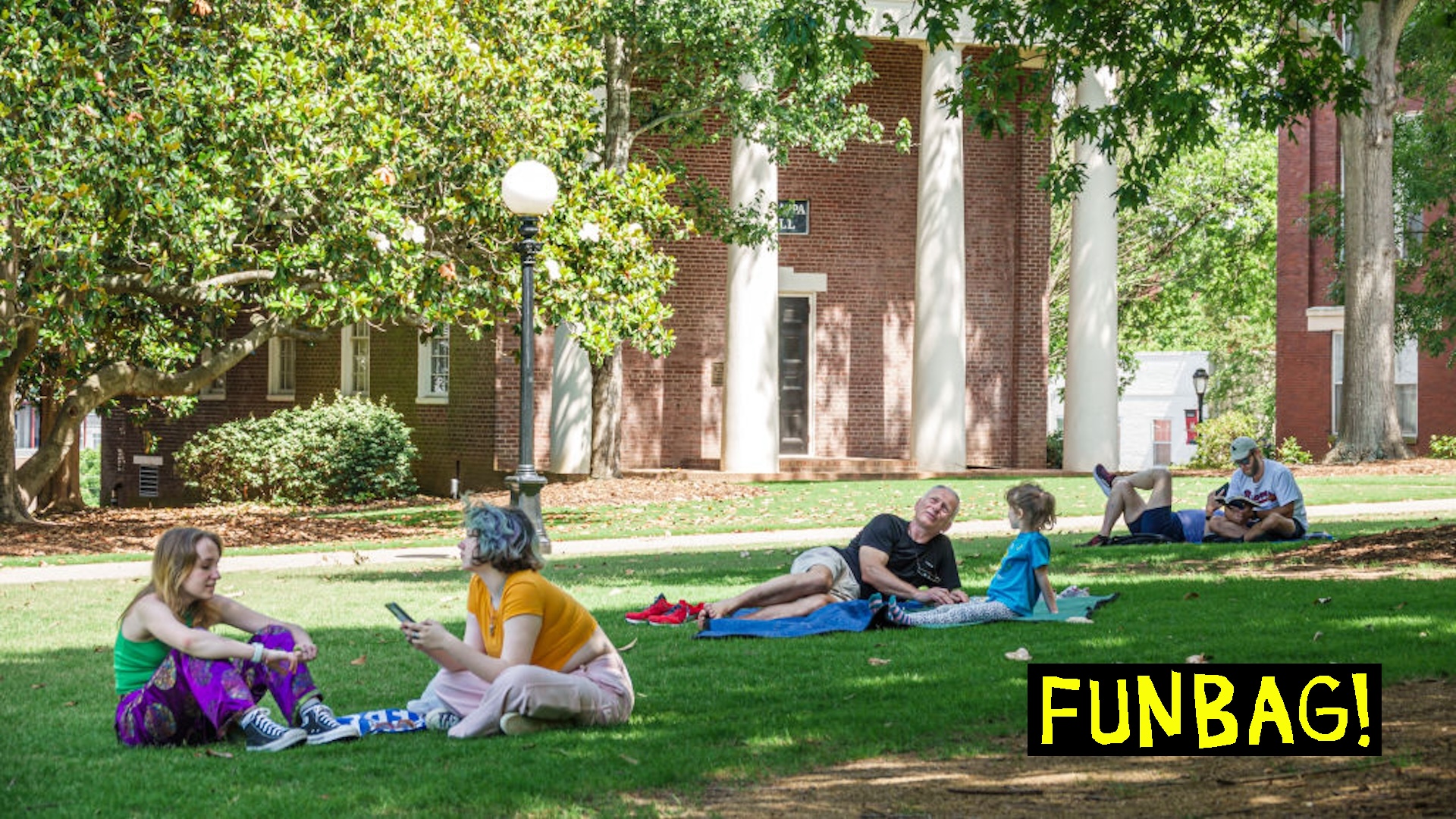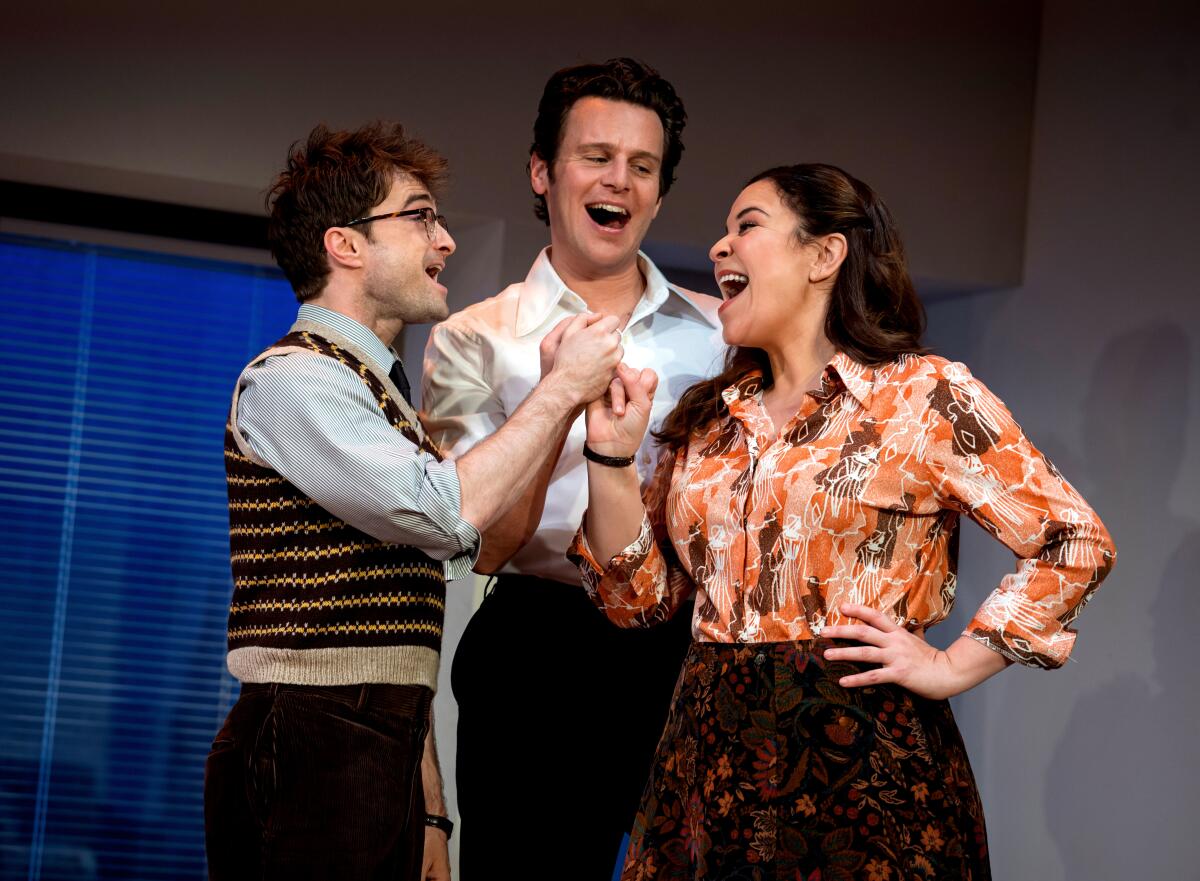Brandy: This was my first read of The Art of Fielding, though I do have memories of it being, like, A Book You Should Read back in the day. I’m not sure exactly what I was expecting, but I found it quite winsome! It has an undeniable charm, and there is a certain quaintness to it that I enjoyed a lot. Less baseball than I thought there would be, maybe. Am I the only one who was reading it for the first time?
Maitreyi: I also read it for the first time! And I knew only very superficial things about it before—that it had to do with baseball, that it had been at the center of a major bidding war, and that it earned the author a big advance. It was a bit more folksy and commercial (in a good way!) than I expected. But it ended up being a book I was surprised I hadn’t read before, even if my feelings were a little mixed. Midwest campus baseball novel is very much my speed.
Luis: This was my second time reading it. I picked up when it first came out, read it in a weekend, and then never thought about it again. So much so that my main memory of the Owen thing was that he fucking died, which was very much not the case, oops.
I will say, though, Brandy, I actually remembered there being even less baseball. I'm not sure why, but I remembered it being like 80 percent campus novel and 20 percent baseball, when it was closer to, what, 60-40? Thankful for that, for reasons I'm sure we'll get into later.
Brandy: We can get into them right now! Tom, in your introductory essay you described it as “a great baseball book stretched too thin over a middling campus novel” and I have to say, I didn’t mind some of the campus-novel aspects as much as you and Luis seemed to. What did you find middling about it?
Tom: I loved the campus as a setting. I loved hanging out in the descriptions of the various rooms and offices and quads—I badly needed to hang out in the VAC with my boy Mike Schwartz. The stuff that I didn’t like was everything that made less time for getting into the Schwartz-Skrimshander relationship, which is the heart of the book and a really fascinating dynamic that is so specific to the experience of being teammates. Mike and Henry are the mythical “not friend or lover but secret third thing,” and I was just kinda bummed when they had to veer into a more traditional love triangle/friends growing apart narrative. I also still have no idea what to do with the Affenlight and Owen relationship. I felt like I never really got a sense for who either of them were, why they liked being together, or what they meant to each other.
Brandy: Something that I was surprised to be charmed by, rather than irritated with, is how eager Harbach is to make sure the reader gets what he’s doing with that stuff. Like, it’s not enough to have Melville figure far more prominently than is warranted at the school, better also have Guert write his dissertation on homosociality in Melville’s work. Relationships between men are beautiful and complicated and don’t you dare forget it!
Luis: This is an extremely unfair comparison, but I kept thinking of The Secret History while reading the campus parts of this, and while they are obviously different books going for very different things, I couldn't help it. I think my issue with the campus parts is that the characters are very underdeveloped. Who is Owen? I have no idea. He's gay, he's smart, he cares about the environment, and that's it. Does Henry ever go to class except for the one scene where he sees Pella auditing? It was nice to read about the actual campus, though not the Melville parts. That was boring.
I also didn't care about any of the relationships the book asks me to care about in the non-baseball parts, except for Henry and Schwartz. That is well developed, but since that actually is mostly developed through the baseball parts, the campus stuff only served as distractions. I was more interested in whether Henry would get over the yips, or Schwartz's pill addiction, than I was about whether Henry and Pella would sleep together a third time. (God, I hated that whole thing.)
Owen and Affenlight? Creepy and, again, would have mattered more if Owen wasn’t kind of a perfect gay ghost floating around the surroundings of the story. Why did Affenlight like him, besides the age difference and, I guess, the fact that Owen is the only gay student at Westish, apparently? It was just so shallow. And Pella and Schwartz? No, thank you. There was no reason for them to be together, except because this world needed to be so small as to only feature five people. I actually did find Pella an interesting character who kept getting steamrolled by dudes who made her a more boring personality. Except for the chef, he was cool. I’d read more about him running the school kitchens like the navy.
Brandy: I read Affenlight as being a sort of counterpoint to Henry. Both are driven to a kind of madness through an overwhelming fixation that we can call love, both see themselves as having one chance at happiness. Henry is all youthful potential, and Affenlight is all aging desperation.
Maitreyi: That’s a good way of putting it, and I felt a similar way. Obsession can be treated like a flaw or easy source of comedy, but theirs was written in a pretty restrained, sympathetic way. Part of the book’s charm is that it’s really generous to its characters, I thought.
Brandy: Totally agree. I was surprised by its warmth given its reputation as a book about masculinity.
Luis: I don't fully disagree with you both, but I felt like Affenlight specifically was too shallow for his obsession to be sympathetic to me. We never really learn why he's so fixated on Owen, or rather, why his fixation is just on Owen and not his own sexuality. When talking to Pella about it after she finds out, he says "there is no in general" with regards to whether he's gay or straight or whatever on the sexuality spectrum. He says, "Just Owen." Because the reasons why are, in my opinion, never fleshed out, it's easy enough for me to default back to Because Owen was there, and Owen is gay. Add in that I thought he was a pretty poor father to Pella, and I didn't really feel much for ol' Guert.
Tom: Maitreyi, your point about the book being really generous to its characters is where I think the campus as a setting really works. Campuses are these protected places, and Harbach moves his characters back and forth across all these lovely descriptions of the Westish campus and the surrounding town. It’s strange how cozy he was able to make a book about psychic damage and obsession feel—everyone’s always near a bookshelf or drinking tea or seeking comfort in their own little corner of the campus. It felt like the book itself was trying to protect and nurture these characters, and as a reader I couldn’t help but follow that same impulse.
Maitreyi: It was basically the opposite of our last campus-novel DRAB, the incredibly mean-spirited Lucky Jim.
Brandy: The whole thing felt very romantic in a distinctly American way, which I think goes some way to explaining the difference between it and a British campus novel. The baseball, of course, but also the pastoral setting and the big tender-hearted ideas about duty and self-improvement and exercising both body and mind. Something that kept striking me as funny is that he was really not able to let himself write a dumb jock. Even though Schwartzy understands himself as some kind of meathead, it’s because his ancient Greek is only just okay.
Luis: I loved Mike Schwartz. To me, he felt like the closest avatar for Harbach's exploration of masculinity, how it's hard to be tough and loving in equal parts. To your point, Brandy, he feels like the most generous version of an American young man from the Midwest, someone who has been raised to be the most important person in everyone’s lives but who also understands the power that role has, and he mostly uses it for good. When he breaks down, it’s heartbreaking.
Maitreyi: This is definitely a novel about how much being a catcher fucks up your body. Huge Mike fan! And all those things are true—though it’s funny, the very first time we meet Schwartzy, he’s thinking (and saying) some unkind things about Henry. So it was nice to have those early expectations subverted as the book went on.
Brandy: I loved the callback to that at the end, via the psychiatrist who sees him as a sadist, and the subtle implication that maybe throwing the ball around with your pal is better than therapy.
Luis: That psychiatrist should not have a license, but she’s a great throwaway character. “Are you some kind of pussy?” killed me. Why are you saying that to your clearly distressed patient?! Love it.
Brandy: Another bit I adored is the actual text of the fictional The Art of Fielding. I want to read that book and conquer death via being a shortstop.
Luis: Aparicio Rodriguez—where did he go to college? Yup. (Venezuela.)
Maitreyi: Humiliating confession: I am a HUGE baseball fan and when the fictional book and Aparicio were first mentioned, I was like, What? How have I never heard of this guy! But the book-within-a-book bits were so fun, and it was fun to read them and think of the many (real) shortstops I have loved to watch.
Tom: That’s very brave of you to admit, Maitreyi. I also loved the Art of Fielding bits and how easily it was to conceive of Rodriguez as a character. Harbach was basically like, What if Omar Vizquel was kind of zen with it? And that clicked just fine for me. I loved the excerpt from near the end of the book, about how a shortstop only reacts to what he sees, like a hand raising in a mirror image. Good stuff.
Luis: I loved that the book kept popping up in the hands of the various characters. At one point, even Pella is reading it! I also love how Henry was able to pass on its wisdoms to Izzy Avila, and how at the end, Izzy has become Henry Jr. even if he doesn’t quite have the same genius. A book that can turn you into a national-championship-winning shortstop sounds like something that should actually exist.
Tom: Brandy, I’m curious how the more baseball-heavy parts of the book landed for you as a non-sports fan. Reading it this time, I felt like the last 100 pages or so were just an incredible standalone sports story. Mike looking around the huddle and telling everyone they are scary motherfuckers, Starblind trying to gut his way through a miserable start, Henry forging a spiritual connection with the opposing pitcher … all that shit had me so locked in.
Brandy: I found my lack of sports knowledge to be less of an issue with this book than with the cycling novel we read last time, although in both cases I was completely won over. There were certainly moments where I wasn’t sure exactly what was happening, but Harbach is skilled at instilling the sense that whatever it is it’s important, and so I could feel the tension ramping up. The bit about the scrawny (filthy! So filthy!) pitcher seeing the same hunger in Henry that he knows in himself, and adjusting his strategy accordingly, was really great. In that case, as throughout the book, I could understand the relationships even if I wasn’t totally sure about the physical dynamics.
Luis: I really liked how the baseball stuff was so brisk. Baseball, famously a slow sport, is turned into just moments of genius and heartbreak. Even in that final game, there will be a long bit explaining the emotions of the relevant players as they step up to bat, but then the actual action is over in a flash. That's the most true-to-life way to talk about baseball, a sport that is all mental with short bursts of physical prowess. Henry's at-bat where he gets plunked, as Brandy said, includes wonderful bits of characterizations for the opposing pitcher we have known for like three pages. And then, Mike's at-bat at the end, especially, is a masterclass of thought-versus-action: “Each of us, deep down, believes the whole world issues from his own precious body, like images projected from a tiny slide onto an earth-sized screen. And then, deeper down, each of us knows he’s wrong. Swing and a miss, strike two.”
Tom: It’s also really hard to come up with a dramatic fictional game that doesn’t feel cliche. I can for sure say I’ve never encountered a book or movie where the winning play is made by an emaciated kid in the midst of a total psychological breakdown who has to pinch hit because his teammate’s age-gap lover just died.
Luis: Suddenly, Freddie Freeman’s Game 1 grand slam doesn’t seem so cool, eh??? I agree, though, that it’s a job well done that none of the baseball stuff feels same-y, and that it never feels like a story we all know. Even each of Henry’s errant throws once his mind starts to take over his body feel like a new gut punch, rather than just establishing a pattern. I, deeply and earnestly, wanted this skinny kid to make the damn throws!
Maitreyi: Yes, you really feel the ways in which both reading novels and watching sports can be these intense vicarious exercises.
Brandy: Tom, I know you suggested this in part because we all saw a tweet claiming that it had no cultural impact. Having reread it, do you think it deserves to have more?
Tom: I do feel like it deserves to be remembered as a really great sports book, but that is not all the book wants to be, and I feel like the non-sports stuff mostly lands as a worse version of better novels. Maybe this is unfair and entirely influenced by the fact that I watch too much TV, but while reading it this time, I couldn’t escape the feeling that a lot of what I was reading was in the book for the sake of getting it optioned. So I guess my answer is that it’s fine that nobody seems to think or talk about this book anymore. I’m sure someday a trailer for an Apple TV series will drop and we’ll all get to remember it again.






